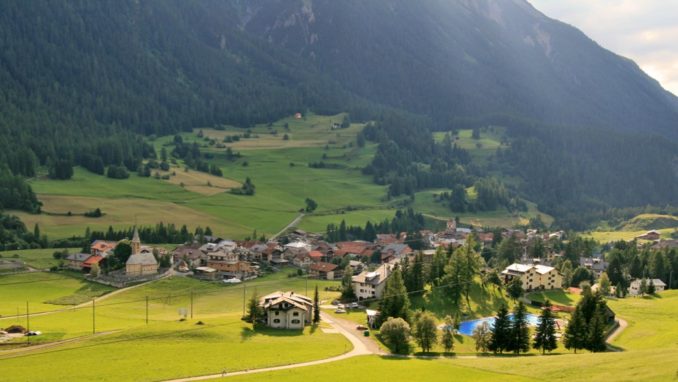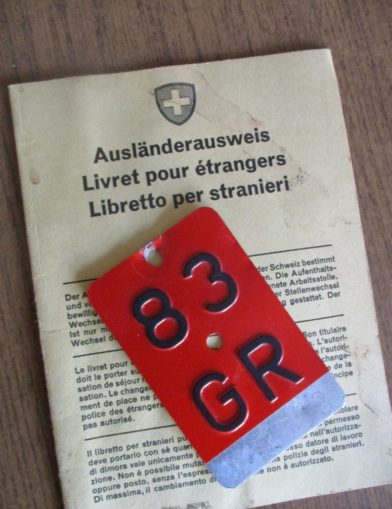
[Public domain], via Wikimedia Commons
The Switzerland I knew in the 1980s was the other side of the country from Vaud, the remote canton of Graubünden (Grisons), home to German-, Italian- and Romansh-speaking farmers and villagers, where Alpine cattle were still driven down steep lanes, their cowbells softly bonging, country homes had indoor ground-floor byres and everybody’s uncle was in private banking. The place-names were otherworldly — Scuol, Zizers, Vaz, Chur, Laax, Susch, Engadine, Zuoz, S-chanf (that’s not a typo) — and in some cases pre-Roman. It was the largest, highest and most sparsely populated canton, and, I liked to think, the most Swiss: airy, breathtakingly lovely, Romansh-speaking in corners, self-satisfied and stiff with wealth. Two of the nearest centres of population were Davos, which was little-known then, and St. Moritz. Liechtenstein was not far beyond Davos.
Here, in the mid-1980s, I did a summer stint as a kitchen drudge in a guesthouse in the little town of Bergün, which, if you google the image now, you will see is everybody’s dream of Switzerland — a prim cluster of ochre-roofed cottages amid lush pastures and winding lanes, surrounded on all sides by massive cloud-cropped peaks. I won’t give the hotel’s real name, as people I am about to insult may still be there, but it was large and central. I’ll call it the Gasthof Edelweiss.
Back in those days, of course, it was incredibly difficult getting a job in Europe because we did not have the EU to arrange everything for us. You had to apply by post for a work permit, with forms which took whole minutes of your time to fill out. After you arrived, you sometimes had to report to a local office to register, and they might give you an ID card. How exhausting it all was.
But Switzerland really was a palaver. Unlike France and Germany, the Swiss made all foreigner workers, even seasonal ones like me, take an expensive medical on top of the paperwork. I had to get Swiss health insurance. I brought a bike with me, and found I was required to apply and pay for a little short-stay Swiss registration plate for bicycles (which I still have). And they made you pay for everything, right down to their own postage.

© Joe Slater, Going Postal, 2020
We were housed in spare rooms at the top of the building. I shared a twin-bed garret with a Croat called Branko. It was an unlikely pairing. I was a sheltered graduate who had just come off a German course studying starchy eighteenth century classics like Die Leiden des Jungen Werthers. Now I found myself living amid a litter of empty bottles, discarded clothing, cosmetics accessories, pornographic magazines and cowboy booklets in Serbo-Croat. The day I arrived, he was out, so I profiled him based on this evidence: sleazy, vain, messy, shallow, coarse. It didn’t look promising.
But Branko was great. He admittedly was sleazy, vain, messy and culturally shallow, but he was also kind, smart, fun and worldly-wise. With gypsy looks, he was in his late 20s, with flowing black hair and a handsome face apart from a couple of missing front teeth. He claimed to be a former under-21 footballer with Red Star Belgrade who had packed it in for the less stressful life of a narcotics dealer, and then reformed himself; he was now supporting dependents from one or more relationships. This back story may or may not have been a pack of lies; I didn’t care. For me, he was just a good companion for the season.
We didn’t actually see much of each other on the job. I was a day-time kitchen hand, and he was an evening waiter. He would come off-shift at midnight, pumped up like a rock-star straight after the show, and there would be no-one to talk to. Except me, the chronic insomniac who never nodded off before two anyway. We would have a natter over a shot or five of slivovitz, a plum brandy he had sent over from home. Then he would go out to the Darlux or Piz Ela late-night bars looking for good-time girls, who were a rare commodity in Graubünden. I would often still be awake when he got back a few hours later, alone and sozzled but still buzzing, and we would have some more slivovitz. It was like that night after night.
* * *
My day at the Edelweiss began at seven-thirty or so, when a swarm of flies would invade our room through the permanently open casement. Branko snored through it, but the little bastards repeatedly settling on my face were better than any alarm clock.
A rudimentary breakfast of bread and coffee would follow downstairs, with the other two kitchen scullions, the Spaniards Manuel and Modesto. At around eight, an old man would drive a single heifer down the road outside, and its bell was like a factory whistle.
The aprons went on, and work began. I wiped the tables, lined the bins, restocked the fridges, washed the oven trays, and dismantled the grill and cleaned its innards. The dirty pots and pans started to come in from the morning’s cooking. There were also apples and onions to peel, garlic bulbs to break up, lettuce to shred and oil bottles to fill.
At midday, the “bons” (orders) would start dropping down the chute into our basement kitchen like little explosives. For the next four or five hours, the bons dictated our lives. During the restaurant opening hours, there was constant stream of dirty pans and dishes to wash. When it got really busy, they asked me to help with food preparation too.
Now, I consider myself a dab hand with the dishcloth, but handling food and drink has never been my forte. In my callow teens, I managed to get myself sacked from a bar job for smashing half-a-dozen glasses in one evening and handing a customer a 50-50 mix of Carlsberg and Robinsons cordial when he ordered a lager and lime.
I was now eight years older but sadly little the wiser when it came to kitchen work. Here, I drenched the Salat in vinegar; I could not bread the schnitzel evenly; I could not even beat the omelette eggs right. The chef soon came to hate the sight of me.
The chef was a taciturn man in his fifties with the general air of an unpopular schoolmaster — aloof, snide, charmless, hypercritical, the very antitype of the manically charismatic chefs you see on TV. He used Italian with the two Spaniards and German with me, but he seldom spoke at all, except to bark out one-line orders — Clean this knife! Get some cream from the fridge! — or fire off a jab: “Wollen Sie mich verrückt machen!” (You’re driving me nuts!). In Germany a year before, my employers in various crappy jobs had usually used the friendly “du”-form to say “You.” The chef here stuck with the distancing “Sie,” as if he were a solicitor with his client. I couldn’t tell if this formality was a Swiss thing generally, or just his character.
For a while, I tried being friendly. That stopped when I innocently asked him one morning what was on the lunch menu that day. His reply was, “What’s that got to do with you?” The only kitchen denizen he had any time for was the cat, Ferrari. I privately labelled him the Old Git.
The whole summer there swiftly degenerated into a low-level personal war. I was Clouseau to the Old Git’s Dreyfus. In addition to not being very good at food preparation, I dropped stuff daily — pots, dishes, a tray of duck pâté he had spent all morning on. I spattered him with fat droplets by tossing a schnitzel too heavily into the frying pan. One afternoon, I managed to nearly shut down the kitchen by dropping a wet cloth down the back flu of the electric grill, a contraption the size of telephone booth that I had to clean using a step-ladder. The bang and flash did not come immediately, but while I was haltingly explaining what I had done to the back of the Old Git, who was working on a flan. The grill had short-circuited and the most of our menu was off the rest of that day. But I was pretty pissed off that he had ordered me to clean a big piece of live electric equipment using a bucket of water. That repair cost the hotel 400 francs, plus the lost income from a half-a-day’s meals that weren’t sold. But I didn’t feel too bad about this. In fact, that night, soused in slivovitz, I was inclined to view it as a small win.
But the Old Git held all the trumps. The job I hated was killing the trout from the hotel pond. Trout was a pricey house specialty, so it was a double delight for him to get a trout order, and then to send the squeamish English cretin to deal with it. He could have sent my colleague Manuel, who was much more efficient at it than me. But usually, the command came in German — “Forelle!” — and I had to drop everything and go to the trout tank.
Each day’s stock was fished up from the pond in the garden and kept in a death-row tank inside the kitchen. Because there wasn’t a sink to spare in the kitchen, when an order came I had to take the fish to the laundry room next door, where there was a large sink.
You killed them by bashing them with a single blow to the top of the head with the eight-inch tubular sink plug, which was like a small truncheon. When you got it right, the trout shuddered for a second or two and went still. Quick and clean. Alas, usually I couldn’t get it right. An adult trout is a slippery one-foot long and can be difficult to keep hold of in one hand when it is thrashing about for dear life. Often, you missed the cranial sweet spot or you dropped it. That’s why you needed the sink. I had some gruesome little battles in that laundry room.
The other thing about the laundry room was that here you met the chambermaids, who otherwise frequented a happier universe beyond our ken, that of the upstairs guestrooms with the plush furnishings and the fantastic views across the valley. Normally, your paths never crossed, but here you could have a nice little private chat with a chambermaid bringing down bedding for washing. You could even flirt. The trouble was, of course, that during these trysts you were usually encumbered with an expiring trout. You couldn’t just put it aside; you had to deal with it instantly.
One morning, I was at the sink when Radmila, a pretty Rumanian-speaking maid, was waiting for access to the washing machines with a basket of used towels. I was in her way. Mistiming a crisp coup de grace on the bonce of a particularly obstreperous trout, I whacked myself heavily on the wrist. I whelped with pain and rage, and then bashed the trout’s head so hard that one of its eyes popped out and landed on the floor at her feet. Heaven knows, there is little manly about cudgelling a fish, but I defy you to imagine a less cool scene than your hero scrabbling about at the feet of a pretty chambermaid trying to retrieve a stray trout eyeball.
Even after I got reasonably competent at trout slaughter, and could dispatch the things quickly and relatively humanely, I continued to loathe this job. If the fish had been able to bite, bleed or scream I don’t think I could have done it at all. It’s no more than a daily chore for millions of fishermen, but to the bitter end, I could not get used to the routine of taking life.
The trout were stocked in a pool at the back of the garden, annoyingly positioned in front of all the guest tables. When the death-row tank in the kitchen ran out, we had to get the fish direct from the pool. This furnished me with a whole new stage on which to flaunt my ineptitude.
Catching a trout in a packed tank that consists more of trout than water is not difficult. Catching a trout in a pond the area of a squash court is a different proposition. On several occasions, I just could not net one. Once, one of the waiters had to put down his tray and come and help, and — the embarrassment still stings — on one occasion a nicely dressed lady, an executive secretary type, got up from her dinner, politely asked for the net and caught one for me. I imagined the Old Git standing at the window watching this, smiling subtly and stroking Ferrari. Gutting them was a shit job too, but I will spare you the details.
© Joe Slater 2020
For my other free downloadable pdf travel books on Europe and East Asia, please visit this website: iTabibito.com.
The Goodnight Vienna Audio file
Audio Player
срочный займ на карту ферратум займзайм под недвижимостьзайм на карту круглосуточно без отказа где можно взять займ без отказачастный займ тюменьзайм 5000



